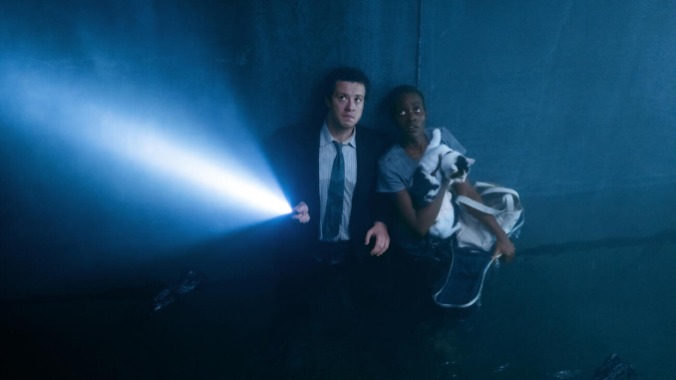A Quiet Place: Day One Plays Like a Cloying, Perfunctory Commercial

In 2024, IP is king. A Quiet Place: Day One, the prequel to John Krasinski’s A Quiet Place, is just another dismal example of this. The first Quiet Place was decently effective in its sensory novelty—evocative in spite of (and perhaps because) of its TradCath ideology. The premise of Michael Sarnoski’s Day One hints at a more filled-in world, but plays more like a maudlin, shallow commercial for the franchise, aided by an overused, cloying score and simplistic, navel-gazing character arcs.
A Quiet Place: Day One centers on the terminally ill, misanthropic Sam (Lupita Nyong’o), who lives in a hospice right outside of New York City with her service cat Frodo (the remarkably chill star of the picture). At the start of the film, care worker Reuben (Alex Wolff) promises her pizza and a theater outing if she joins a group trip to Manhattan. That same day, of course, meteor-like objects attack the city from the sky and extraterrestrial creatures, sensitive to sound, begin to ravage the hordes of inhabitants afterward. The group of cancer patients, including Sam, are stuck in the chaos.
Sam plays more like a walking archetype rather than a full character, though Nyong’o’s performance is one of the film’s strengths, often filling in gaps in her character that don’t follow logically. For instance, Sam’s unyielding desire to head to her favorite pizza place, Patsy’s Pizzeria in Harlem, even after A Quiet Place: Day One’s apocalyptic event, is only barely convincing because Nyong’o is so skilled at portraying the most basic of emotions: fear, despair, loneliness, belligerence. She is our proxy. She wants to get pizza from a place that’s probably been destroyed due to a burgeoning alien invasion? Sure, we’re with her. Maybe. The introduction of Joseph Quinn’s Eric, a British law student, is also a highlight, simply because he is adequate at embodying a pathetic, cat-like nature that works opposite Sam. His attachment to Sam and Frodo feels natural only due to Quinn’s ability to evoke the qualities of a dying bird.
-

-

-

-

-

-

-

-

-

-

-

-

-

-

-

-

-

-

-

-

-

-

-

-

-

-

-

-

-

-

-

-

-

-

-

-

-

-

-

-








































